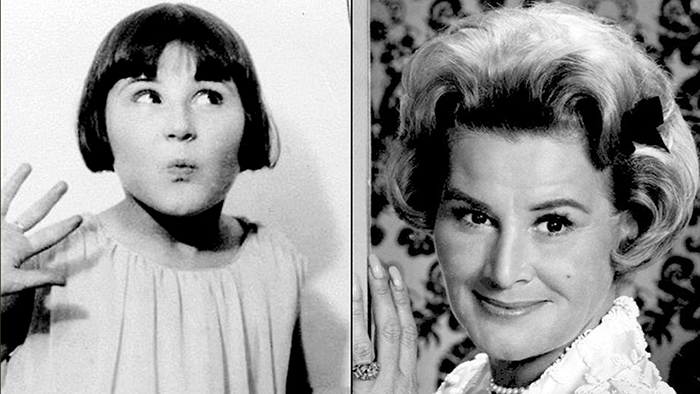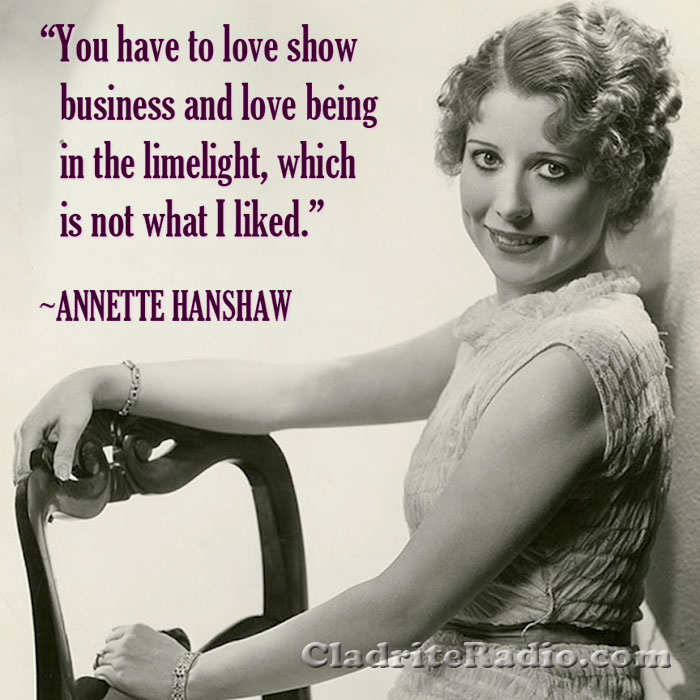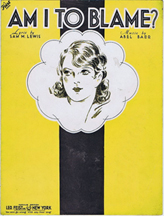Here are 10 things you should know about Buddy Ebsen, born 115 years ago today. In a career that spanned 82 years, he enjoyed success in nightclubs, vaudeville, on Broadway, in pictures, and on television, among other areas of endeavor.
Tag: Ruth Etting
Remembering Rose Marie: 90 Years a Trouper

Few entertainers in history enjoyed as long a career as did Rose Marie, born 100 years ago today. Her career began when she was just four years old (known then as Baby Rose Marie, she had a weekly radio program that was broadcast nationally before Shirley Temple was even born), and she went on to enjoy success in vaudeville, radio, records, motion pictures, Broadway, and television.
In 2017, a delightful documentary, Wait for Your Laugh, was released that told the story of her amazing life and career, and we’re delighted to share a very lightly edited transcript of a telephone conversation we had with her shortly after the film’s release. Buckle your seat belts; it’s a delightfully wild ride. As you’ll soon see, even at 94, Rose Marie was as sharp and as funny as ever.
Cladrite Radio: I have a lot of things I’d like to talk to you about.
Rose Marie: First of all, let me ask you a question.
Cladrite Radio: Sure.
Rose Marie: Did you see the movie [Wait for Your Laugh]?
Cladrite Radio: I did!
Rose Marie: What’d you think of it?
Cladrite Radio: I loved it. I thought it was great.
Rose Marie: What’d you like about it?
Cladrite Radio: I’m very interested in the popular culture of the 1920s, ‘30s and ‘40s, in addition to …
Rose Marie: That’s my era.
Cladrite Radio: It sure is. I am involved with an online radio station that features music of that era. We play some of your records on the station.
Rose Marie: Oh, nice.
Cladrite Radio: When I got the chance to interview you, I was so excited. I’m a fan of your music, and I grew up with you on TV as well.
Rose Marie: I know, everybody says that. It makes me feel so old.
Cladrite Radio: Oh, well, I’m not so young myself.
Rose Marie: I’m 94, wanna bet?
Cladrite Radio: You’re doing great. You’re probably doing better at 94 than I am at 59.
Rose Marie: Okay.
Cladrite Radio: I wanted to ask you about the documentary. Whose idea…
Rose Marie: I’m very happy to tell you. I’m very proud of it. I love it. I’m so proud of [director] Jason Wise, I can’t stand it. I think he’s a genius. I think he’s going to be one of the biggest men in the business in a couple years. I think this will introduce him to everybody. I think he’ll even be bigger than Steven Spielberg.
Cladrite Radio: I’ll bet he wouldn’t mind that a bit.
Rose Marie: Oh, he’s wonderful. You have no idea. You don’t know how particular he is. When we decided to do this thing, I kept everything from the time I was three years old. Postcards, pictures, film, anything I had, I kept. When he talked about doing the documentary, he says, “Let’s talk.” I said, “I have everything in scrapbooks. Why don’t you just go through everything?” I emptied out my house, and I mean he cleaned me out of everything. He put it in that documentary. Just a genius.
Cladrite Radio: All the materials that we see in the documentary, the film clips we see and some of the programs and promotional materials and various things that are included in it…
Rose Marie: All mine. All mine that he dug up out of my house.
Read More »
Remembering Annette Hanshaw on Her Birthday
Cladrite sweetheart Annette Hanshaw was born 120 years ago today in Manhattan. For us, she’s the gold standard for songbirds of the late 1920s and early ’30s; we think she’s keen. She retired after only a few years—the spotlight didn’t suit her—but what a legacy she left. We’ll featuring her music all day today on Cladrite Radio, so why not tune in now?

Remembering Gloria Stuart on Her Birthday
Gloria Stuart was born on Independence Day, 1910, in Santa Monica, California. In 1999, when she was just a kid of 89, we got to interview her on the occasion of the publication of her memoir, I Just Kept Hoping. The interview was conducted over the telephone, though we did get the chance to meet Ms. Stuart when she came to NYC for her book party.

We considered it quite a thrill, we don’t mind telling you, to get to interact with Ms. Stuart. After all, this is the women who starred opposite Claude Rains in James Whale‘s The Invisible Man, who appeared with Boris Karloff, Melvyn Douglas, and Charles Laughton in The Old Dark House, who worked with greats such as Irene Dunne, Ralph Bellamy, Pat O’Brien, Lionel Barrymore, Lee Tracy, Nancy Carroll, Frank Morgan, Paul Lukas, Edward Arnold, Eddie Cantor, Ruth Etting, and dozens more.
So, to celebrate her 111th birthday, we thought we’d share the interview we did with her in 1999. Enjoy!
It’s been a long, eventful life for former and current movie star Gloria Stuart. She had her first go-around at stardom in the Hollywood heyday of the 1930s and ’40s; then, after taking off 30 years or so to pursue painting, travel, and political activism, she again began to act in the 1970s, eventually garnering a Best Supporting Actress nomination for her role in Titanic. Still going strong today at the age of 89, Stuart has now added authorship to her list of achievements. Her candid memoir, I Just Kept Hoping, is peppered with anecdotes about such memorable figures as Shirley Temple, Groucho Marx, Dorothy Parker, and J. Robert Oppenheimer, the father of the atomic bomb. We spoke to Gloria about her life, her two careers in the movies, and her secrets for living so long and so well.
An Interview with Gloria Stuart
You made three films with director James Whale: The Invisible Man, The Old Dark House, and The Kiss Before the Mirror. What can you tell us about him?
I’m very happy I was in those films. You know, James is a cult figure in England. There are a lot of James Whale fan clubs. Actually, right after I had read for Jim Cameron for Titanic, I had booked a month in London. I went right away, and there were two wonderful James Whale organizations that I met with. He’s getting his due now, thanks to Gods and Monsters.
What did you think of Gods and Monsters? Was it, in your view, an accurate portrayal of Whale?
Oh, yes, it was. Ian McKellan captured James’s elegance, the beautiful manners, the beautiful tailoring, the precision, the whole thing. Of course, no one could be James, but he came awfully close.
The special effects in The Invisible Man hold up remarkably well today for a film that was made in 1933.
Yes, people who see it today—it runs every so often—they say, gee, it’s not an old hat movie at all.
I’m wondering—did the processes that went into creating those special effects slow down the pace of moviemaking at all?
It was never evident. Only James and the cameraman and I guess all the process people at Universal—the rest of us never had any inkling of what was going on. We did do a lot of shooting in front of black curtains. Now, I wasn’t on the set when the bandages came off or anything like that, so I have no idea about that. But it was very, very secret. I wasn’t on the set when they were finagling the bandages off, and so forth.
That would’ve been fun to see.
Yes, it would’ve! Claude [Rains] may have known [how it all worked] but he never said so.
You and your second husband, Arthur Sheekman, were good friends with Humphrey Bogart and Mayo Methot, his wife at the time. What can you tell us about Bogie that we might not know?
Read More »
Sweet nothings, tenderly crooned
 Though the greatest pleasure we take from the wonderful music we share with you on Cladrite Radio stems from the memorable melodies and toe-tapping rhythms, we also revel in the romantic imagery and well-turned phrases found in the lyrics of the day.
Though the greatest pleasure we take from the wonderful music we share with you on Cladrite Radio stems from the memorable melodies and toe-tapping rhythms, we also revel in the romantic imagery and well-turned phrases found in the lyrics of the day.
The lyrics Samuel M. Lewis wrote to accompany Abel Baer’s lovely melody in their 1934 song “Am I to Blame?” recently gave us reason to smile. They’re pleasing on the page, but when sung, they really come to life.
Am I to Blame?
Am I to blame for worshipping you
After so many goodbyes?
If I’m to blame for worshipping you,
Why was I born with two eyes?Am I to blame for clinging to you,
Begging to share all your charms?
If I’m to blame for clinging to you,
Why was I born with two arms?Sighing, sighing brings regret;
Every day is like the day before.
Trying, trying to forget
Only makes me want you more.So am I to blame for loving you, dear?
I’m only playing my part.
If I’m to blame for loving you, dear,
Why was I born with a heart?Lyrics by Sam M. Lewis/music by Abel Baer
“Am I to Blame?” was recorded by artists such as Ruth Etting, Greta Keller, and Victor Young and His Orchestra, but we’re offering Hal Kemp and His Orchestra‘s take on the song. Bob Allen handles the vocals.
Hal Kemp and His Orchestra, feat. Bob Allen—“Am I to Blame?”
